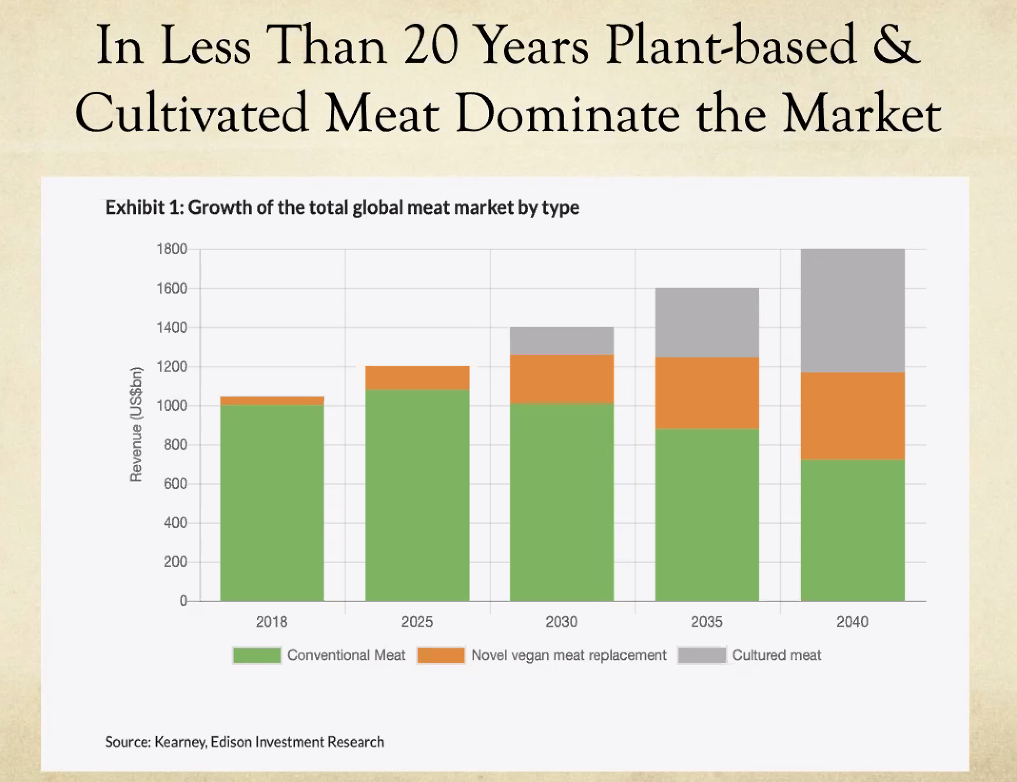Alfano started the talk with numbers and figures. Since the pandemic, plant based meat sales were up 255%, compared to a 53% for the meat industry. An impressive number—but the 2040 projection, she admitted, takes the cake.
According toEdison Investment Research, novel vegan meat replacements and cultured meats will overtake the conventional meat market by 2040. By then, Alfano said, plant-based "won’t be the alternative, it’ll be the industry itself". Right now, the market is changing quickly in one direction: eating healthy while protecting the environment.
“Our food industry is changing by the minute and health remains a driving factor. People are more interested in boosting their immune system and avoiding heart disease, diabetes and other lifestyle diseases.” Also, she adds, environmental factors are a major concern for millennials and gen z shoppers coming into the market.
Taking a wide lens look at plant-based consumers, the population causing such flux in the category are (drum roll): the flexitarians who make up a third of the marketplace. Steady vegetarian and vegan eaters play a role, too, just not as wide of a category as those who incorporate plant-based into their average American diets. The bottom line though, Alfano notes, is that taste is always the vehicle for lifestyle changes.
While plant-based manufacturers and farmers have been at it for quite some time, it’s clear the trend is catching on as major fast-food chains jump on the bandwagon. McDonald's, Alfano recalls, hesitated because they thought they’d run out of supply. Investments are there too. In the first half of 2020, there were $1.5 B investments in plant based products, fermented protein, cell based agriculture.
Riding the Plant-Based Wave as a Retailer: Connecting with Consumers
In a world of extensive information and a never-ending list of dueling theories on what is healthy, consumers can get stuck. Arguably, it’s the retailer who can mend the gap in education. If a consumer questions how healthy a processed plant-based product is, retailers have to respond with clarity to help consumers along.
“This is where retailers can take the lead,” said Alfano. “Is this plant-based product reversing heart disease? Maybe not. But the product is not made with antibiotics or chemicals, and boasts fiber. There are value propositions when consumers choose plant-based options. It’s about crafting the conversation with integrity.”
Keeping up with the Trends
In her work within the plant-based industry this year, Alfano has met retailers hesitant about putting out new products during COVID. “At the beginning of the pandemic, buyers put what they think consumers would need. They were nervous about how new products would do on shelves.” What she’s seen: “The retailers that are doing the best, are adjusting what they buy, and how they communicate what’s in store for the consumer.”
Top trends to embrace? Sustainable packaging, effective communication and transparency in branding—to name a few. Consumers care about animal welfare, clean label products, and are interested in their personal health journey above all else.
Related: Natural Grocers Releases 2021 Trends The Immune Boom Living A Plant-Based Life
Alfano adds that, to reach consumers and expand their regular shopping list, retailers can play around with store real estate.In one study,she recalls, when plant-based meats were put in front of regular meat, sales increased 23-32% in the Midwest.As we enter the new year, retailers should embrace frozen options and consider expanding the selection. Plant based seafood, fermented options and mushrooms, she confirms, will continue to lead the way.
Consumers have time, money, and google in 2021, Alfano said. Make their lives easier by creating a store that makes shopping easier and healthier.
Learn more about Elysabeth Alfano’s workhere. To get in contact with Elysabeth, email her at elysabeth@elysabethalfano.com.










